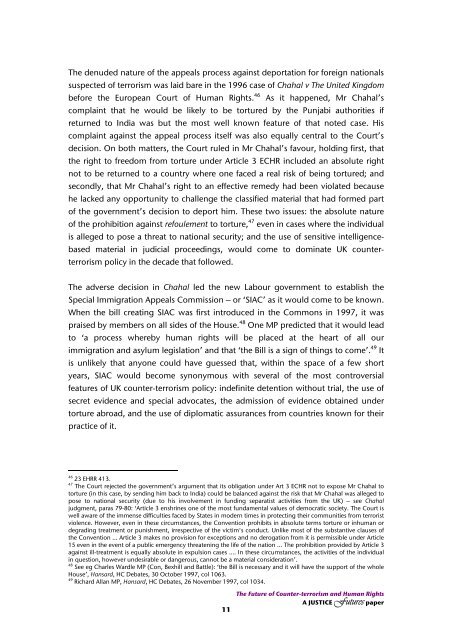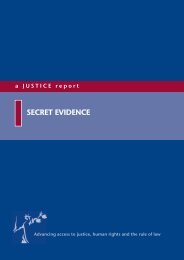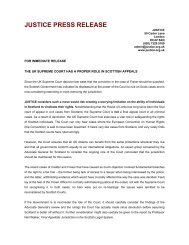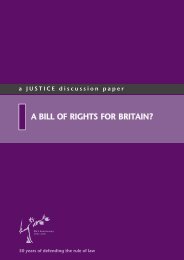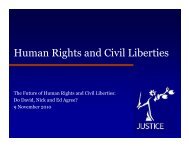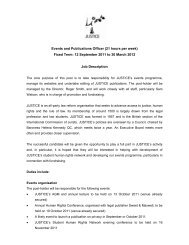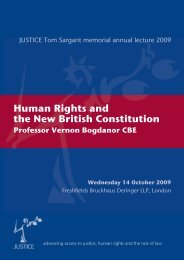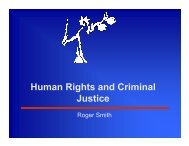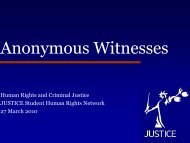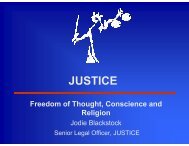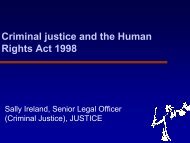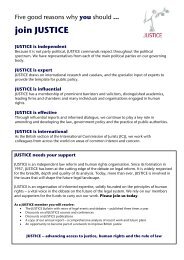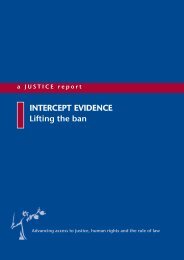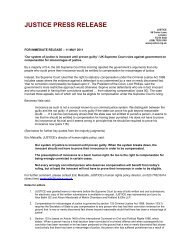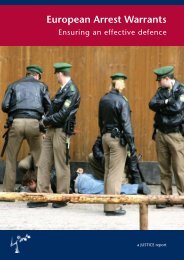The Future of Counter-terrorism and Human Rights - Justice
The Future of Counter-terrorism and Human Rights - Justice
The Future of Counter-terrorism and Human Rights - Justice
You also want an ePaper? Increase the reach of your titles
YUMPU automatically turns print PDFs into web optimized ePapers that Google loves.
<strong>The</strong> denuded nature <strong>of</strong> the appeals process against deportation for foreign nationals<br />
suspected <strong>of</strong> <strong>terrorism</strong> was laid bare in the 1996 case <strong>of</strong> Chahal v <strong>The</strong> United Kingdom<br />
before the European Court <strong>of</strong> <strong>Human</strong> <strong>Rights</strong>. 46 As it happened, Mr Chahal’s<br />
complaint that he would be likely to be tortured by the Punjabi authorities if<br />
returned to India was but the most well known feature <strong>of</strong> that noted case. His<br />
complaint against the appeal process itself was also equally central to the Court’s<br />
decision. On both matters, the Court ruled in Mr Chahal’s favour, holding first, that<br />
the right to freedom from torture under Article 3 ECHR included an absolute right<br />
not to be returned to a country where one faced a real risk <strong>of</strong> being tortured; <strong>and</strong><br />
secondly, that Mr Chahal’s right to an effective remedy had been violated because<br />
he lacked any opportunity to challenge the classified material that had formed part<br />
<strong>of</strong> the government’s decision to deport him. <strong>The</strong>se two issues: the absolute nature<br />
<strong>of</strong> the prohibition against refoulement to torture, 47 even in cases where the individual<br />
is alleged to pose a threat to national security; <strong>and</strong> the use <strong>of</strong> sensitive intelligencebased<br />
material in judicial proceedings, would come to dominate UK counter<strong>terrorism</strong><br />
policy in the decade that followed.<br />
<strong>The</strong> adverse decision in Chahal led the new Labour government to establish the<br />
Special Immigration Appeals Commission – or ‘SIAC’ as it would come to be known.<br />
When the bill creating SIAC was first introduced in the Commons in 1997, it was<br />
praised by members on all sides <strong>of</strong> the House. 48 One MP predicted that it would lead<br />
to ‘a process whereby human rights will be placed at the heart <strong>of</strong> all our<br />
immigration <strong>and</strong> asylum legislation’ <strong>and</strong> that ‘the Bill is a sign <strong>of</strong> things to come’. 49 It<br />
is unlikely that anyone could have guessed that, within the space <strong>of</strong> a few short<br />
years, SIAC would become synonymous with several <strong>of</strong> the most controversial<br />
features <strong>of</strong> UK counter-<strong>terrorism</strong> policy: indefinite detention without trial, the use <strong>of</strong><br />
secret evidence <strong>and</strong> special advocates, the admission <strong>of</strong> evidence obtained under<br />
torture abroad, <strong>and</strong> the use <strong>of</strong> diplomatic assurances from countries known for their<br />
practice <strong>of</strong> it.<br />
46 23 EHRR 413.<br />
47 <strong>The</strong> Court rejected the government’s argument that its obligation under Art 3 ECHR not to expose Mr Chahal to<br />
torture (in this case, by sending him back to India) could be balanced against the risk that Mr Chahal was alleged to<br />
pose to national security (due to his involvement in funding separatist activities from the UK) – see Chahal<br />
judgment, paras 79-80: ‘Article 3 enshrines one <strong>of</strong> the most fundamental values <strong>of</strong> democratic society. <strong>The</strong> Court is<br />
well aware <strong>of</strong> the immense difficulties faced by States in modern times in protecting their communities from terrorist<br />
violence. However, even in these circumstances, the Convention prohibits in absolute terms torture or inhuman or<br />
degrading treatment or punishment, irrespective <strong>of</strong> the victim's conduct. Unlike most <strong>of</strong> the substantive clauses <strong>of</strong><br />
the Convention … Article 3 makes no provision for exceptions <strong>and</strong> no derogation from it is permissible under Article<br />
15 even in the event <strong>of</strong> a public emergency threatening the life <strong>of</strong> the nation … <strong>The</strong> prohibition provided by Article 3<br />
against ill-treatment is equally absolute in expulsion cases .… In these circumstances, the activities <strong>of</strong> the individual<br />
in question, however undesirable or dangerous, cannot be a material consideration’.<br />
48 See eg Charles Wardle MP (Con, Bexhill <strong>and</strong> Battle): ‘the Bill is necessary <strong>and</strong> it will have the support <strong>of</strong> the whole<br />
House’, Hansard, HC Debates, 30 October 1997, col 1063.<br />
49 Richard Allan MP, Hansard, HC Debates, 26 November 1997, col 1034.<br />
11<br />
<strong>The</strong> <strong>Future</strong> <strong>of</strong> <strong>Counter</strong>-<strong>terrorism</strong> <strong>and</strong> <strong>Human</strong> <strong>Rights</strong><br />
A JUSTICE <strong>Future</strong>s paper


